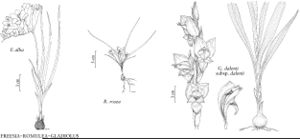Gladiolus dalenii subsp. dalenii
Plants (50–) 70–120 (–150) cm. Corms tunicate, (15–) 20–30 mm diam.; tunic layered, brown, brittle, cartilaginous, outer layer becoming irregularly broken to fibrous, usually bearing numerous tiny cormlets basally. Stems simple. Leaves contemporary with flowering-stem [foliage leaves borne later on separate shoots], 4–6 (–7), at least proximalmost 2 ± basal, distalmost 1–2 cauline, ± sheathing, ± 1/2 length of spike; blade narrowly lanceolate to ± linear, (5–) 10–20 (–30) mm wide, midribs and margins notably thickened. Spikes (2–) 3–7 (–14) -flowered, secund; sheaths subequal, (2.5–) 4–7 cm, inner slightly shorter than outer, apex sometimes dry, pale. Flowers unscented; perianth-tube ± cylindrical, curving outward in distal 1/2, (25–) 35–45 mm; tepals red to orange with yellow mark on outer 3 tepals (or yellow to greenish and often with red to brown streaks on inner tepals), unequal, inner 3 tepals broadly elliptic, dorsal tepal horizontal to downcurved, 35–50 mm, to 22–30 mm wide, inner lateral tepals usually curving outward distally, ± equaling dorsal, outer 3 tepals curving downward, 20–25 (–30) mm, outermost tepal somewhat longer and narrower than outer lateral tepals; filaments ca. 25 mm; anthers 12–16 mm; style branching near apex of anthers; branches (4–) 5–6 mm. Capsules ellipsoid to ovoid, (18–) 25–35 × 12–14 mm. Seeds broadly winged, 8–12 × 5–9 mm; seed-coats light-brown, glossy.
Phenology: Flowering mainly May–Jul.
Habitat: Introduced
Distribution
Ala., La., sub-Saharan Africa, Madagascar, Arabia
Discussion
Selected References
None.
Lower Taxa
"somewhat longer and narrower" is not a number.
